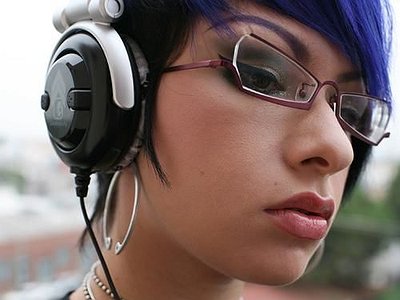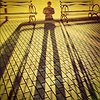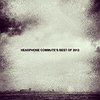The gospel according to...
Remaining anonymous is important to the founder of Headphone Commute. This anonymity affords the mysterious 'HC' the luxury of staying true to the writer's opinion and acts as a safeguard to prevent the ego getting in the way of the one thing that counts, music. The image you'll see associated with Headphone Commute is of artist Zoetica Ebb, but don't be fooled into thinking it's anything more than a face to put to the name on everyone's lips. HC is part of a new order of online music journalism that refuses to hold the sword of Damocles over the heads of recording artists and labels. With the focus taken off relegation, HC is all about recommending what the author feels is good music and encouraging others to open their ears to new experience. With a vivid sense of the responsibility that comes with power, HC prefers to use theirs for good.
When did you start writing about music - and what or whom were your early passions and influences?
It was somewhat accidental, really. It was the summer of 2005, and I was part of a collective that organized warehouse parties, club nights and music festivals. As part of this scene, I was also a DJ playing experimental music, ambient and IDM. I began to notice various connections between the artists and labels that I really liked, and so I started taking notes. Those notes at first were short sketches, which after some time I started publishing online. It was really my first 'Best Of the Year' list that drew an audience who connected with my choices.
Since the early 90s I was a fan of electronic music, and besides the trance and techno records, I also collected releases by monumental acts like Autechre, Future Sound of London, Boards of Canada and the likes. Then, in that same summer of 2005, I became smitten with the gorgeous music of Max Richter - whose album, The Blue Notebooks is currently playing through my speakers as I write this- , Jόhann Jόhannsson, Murcof, and Julien Neto. I particularly remember one jet-lag infused night, asking myself out loud 'What is this music?', while previewing recommendations in Boomkat’s 'Home Listening / Modern Classical' genres. The short notes I was taking slowly grew into reviews, and then, while I was taking inventory of all the positive and negative influences in my life, Headphone Commute was born.
What are your main impulses to write about music?
It’s really to spread the word about good music. Being a fan of electronic music in the 90s was a very lonely experience. Most of my friends did not understand what I liked about the genre. They still don’t. So I turned to magazines, then dial-up bulletin boards, and finally the Internet, to find like-minded people. My music reviews have always been recommendations. When I write, I feel like I’m talking to a group of friends. I hope that the words themselves convey my enthusiasm or express the inner feeling that a particular piece evokes.
While I want to introduce a larger audience to the genres by selecting some accessible pieces, I also want to push the boundaries of their listening habits. And finally, when I sit down to write about a particular album, it’s mostly because I can’t wait to tell everyone about it. I made music my religion, and self proclaimed myself as its preacher. I spread the gospel, if you can forgive me for that metaphor...
What do you personally consider to be the incisive moments and pieces in your journalistic work and/or career?
Because I don’t really consider my writing as part of my career, I’m careful about attributing certain events as strategic moves or certain actions to improve upon my standing. That being said, I will never forget the first time I interviewed an artist in person; or when a composer I followed for years all of a sudden wanted to know what I thought about his unreleased work; or when an unknown bedroom musician suddenly got picked up by a label because of my words. There are many of these tiny moments that generate enough energy and culminate into one.
Currently, I’m in the middle of curating one of the largest compilations featuring the top talent in ambient, modern classical, and experimental music scenes, to benefit all those affected by Hurricane Sandy. This has to be the highlight of my contributions. As I sit here, tiny waves of current are already rippling through the universe, in a not-so-selfish once-in-a-lifetime opportunity to do good. And at the end, I always want to do more.
How would you describe and rate the music scene of the city you are currently living in and how important is it in terms of what you're actually writing about?
I live in New York which is constantly buzzing with musical activity. Although it often feels like something great is always happening somewhere else, I don’t think there’s a single boring day in the city. Living in one of the biggest musical hubs of the world allows me to attend events and festivals where I get to witness live performances, and more importantly, meet the artists themselves. The latter is one of the key elements of my writing. Even a brief interaction with the musician will allow me to glimpse deeper into their soul, connect with a person, and pick up on more intimate details in their work.
The other side of my writing is a very secluded, personal space. This chamber is void of social gatherings, clanking bottles, and terrible sound systems. It simply exists in my head, often on my way from point A to point B, between the cups of my headphones. And so it is in transit where I thrive the most. We're all tourists after all.
When it comes to music journalism, what are your criteria for quality? What are currently your main challenges and ambitions as a writer?
When I read other music pieces, the main thing I want to extract is whether or not I want to hear this music because of the words. I don’t really care for rich vocabulary, clever articulation or blatant regurgitation of a press release. I’m looking for intelligence, emotion and soul. And that is what I try to convey in my own writing as well.
I tend to also concentrate on the positive side of music journalism. There is too much trash talk about "bad music", and that’s really a shame. It’s a shame that even one second is wasted on spreading negativity, when that time could have been put towards a better use. I barely have time to write about the things I like. So when a particular piece moves me, I want to let it move you too. Words are so feeble when it comes to true emotion, even when captured in a just few vibrating strings. I just want to guide the listener and shine the light on a few moldy steps - the rest is up to them.
What do you usually start with when working on a new piece?
I begin with the first phrase that pops into my mind. If the music evokes a particular feeling, then it is with this feeling that I must begin. When I write, the music is always playing in the background. And it’s always the piece that I’m writing about. But it’s not always the other way around. I listen to a lot of music, but only a few pieces make me want to drop everything and jot down some notes.
Imagine that one riff or note that truly brought on a huge flood of emotion. Imagine yourself reaching for the phone to dial a friend that would understand. That's how I feel when I reach for the keyboard and lay down the first draft. It's a feeling I cannot contain. Those are the words that I share with the world.







